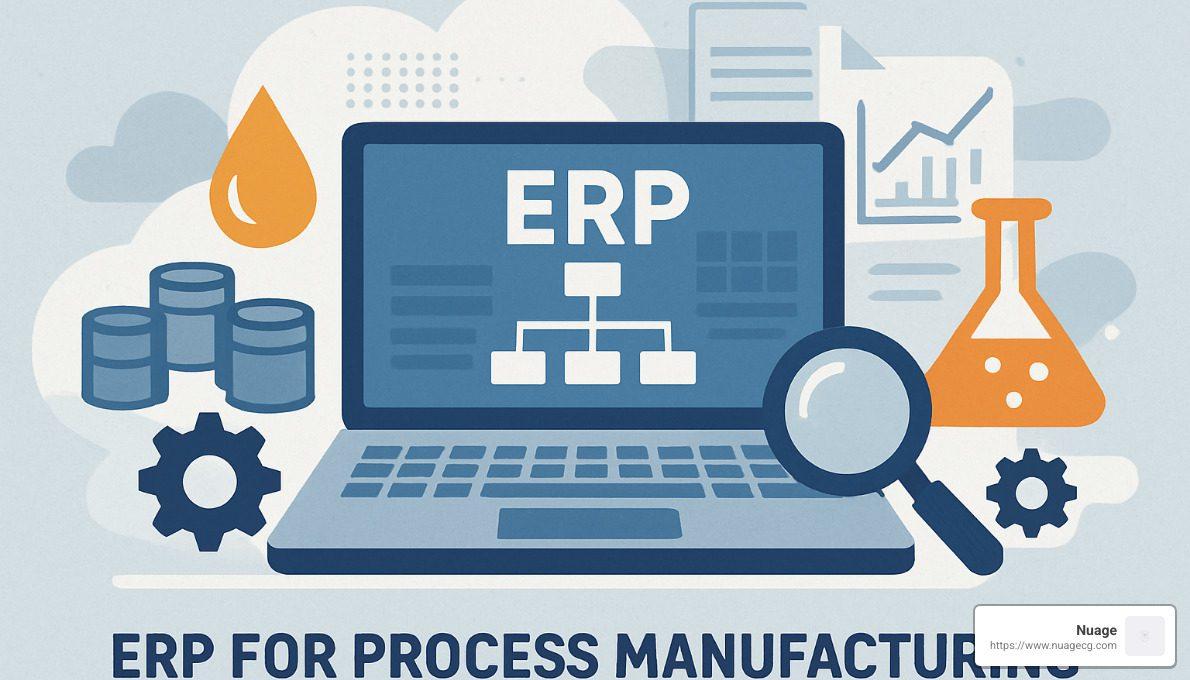Changing Your Process Manufacturing Operations with ERP
When your business combines ingredients that can’t be unmixed—like food, beverages, chemicals, or pharmaceuticals—you’re dealing with challenges that standard software just wasn’t built to handle.
ERP for process manufacturing is the specialized solution designed specifically for your world of formulas, batches, and complex compliance requirements. Unlike generic systems, these platforms understand that your production isn’t about assembling parts—it’s about changing materials through chemical or biological processes.
In my 15+ years helping companies implement these systems, I’ve seen how the right solution transforms operations from chaotic to controlled. Let me walk you through what makes these systems special:
Your formula management needs are unique—you’re dealing with ingredients that need precise scaling, version control, and the ability to adjust for potency variations. A process-focused ERP handles this beautifully, maintaining recipe integrity even as you scale production up or down.
Batch production tracking is another critical difference. When you’re managing yields that naturally vary and need to track every lot for quality and compliance reasons, generic systems fall short. ERP for process manufacturing systems are built around this batch-centric view of the world.
Quality control happens differently in your business too. You need in-process testing at multiple stages, certificates of analysis, and the ability to catch issues before products leave your facility. Process-specific ERPs integrate these testing protocols directly into production workflows.
| ERP Capability | Process Manufacturing Need |
|---|---|
| Recipe/Formula Management | Manage ingredients, scaling, and version control |
| Batch Production | Track lots, manage yields and variance |
| Quality Control | In-process testing and certificates of analysis |
| Compliance | FDA, HACCP, GMP documentation and traceability |
| Inventory | Manage expiration dates, potency, and catch weights |
As Christina Morrison wisely puts it, “Most ERP systems available today are NOT suitable for Process Manufacturing.” This isn’t just an opinion—it’s a reality that can make or break your operation.
“An ill-fitting system can lead to operational bottlenecks, compliance risks, and wasted resources, becoming like a boat anchor that holds a business back.”
The good news? The data shows that 95% of businesses report significant improvements after implementing the right ERP system. The change can be remarkable—shifting your team from constantly firefighting to making proactive, data-driven decisions.
I’m Louis Balla, CRO and partner at Nuage, and I’ve guided dozens of process manufacturers through successful implementations of specialized solutions like NetSuite. These platforms offer the specialized capabilities that make all the difference for formula-based production.
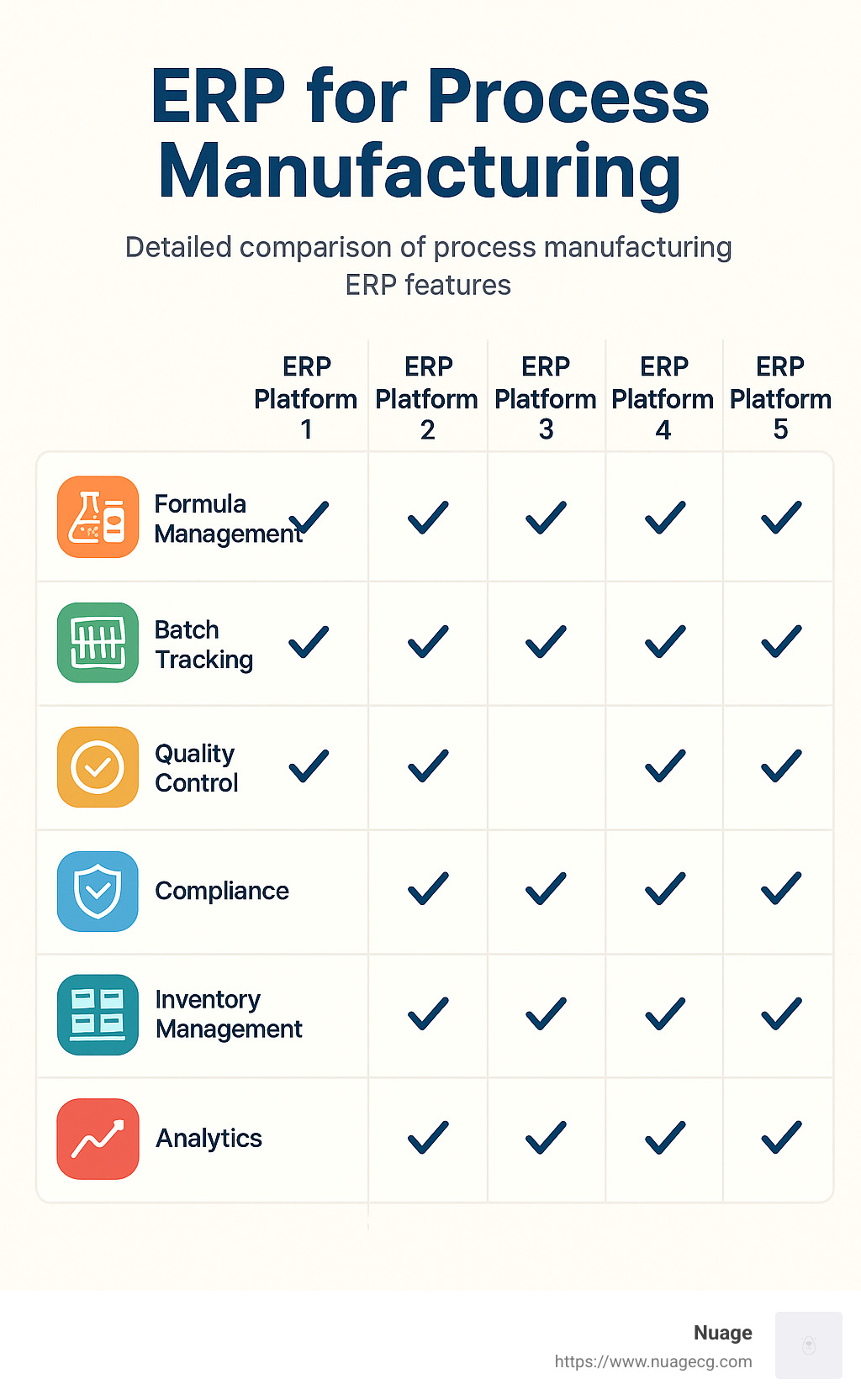
Want to understand more about how these systems fit into your broader digital change journey? Check out our insights on Digital change for manufacturing and ERP for food and beverage industry for industry-specific perspectives.
ERP for Process Manufacturing 101: Key Differences
When comparing ERP for process manufacturing to systems designed for discrete manufacturing, several fundamental differences emerge. These differences aren’t just technical nuances—they’re mission-critical capabilities that determine whether your operations will thrive or struggle.
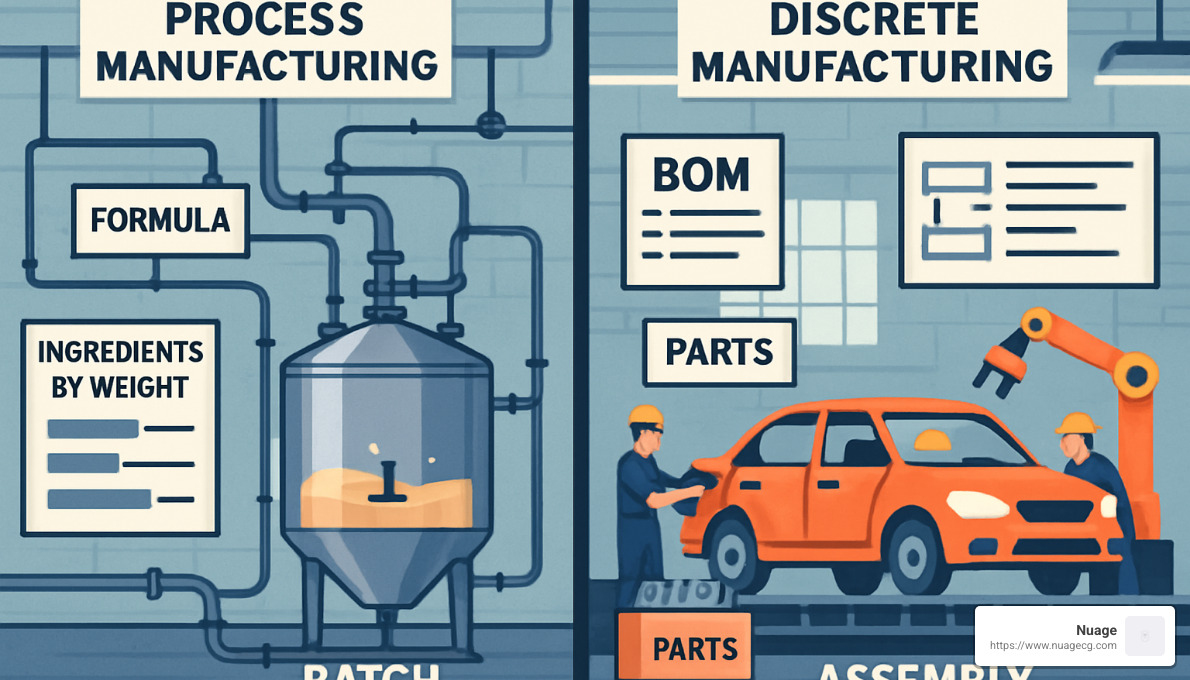
Formula vs. Bill of Materials (BOM)
In discrete manufacturing, you work with a bill of materials that lists specific countable parts. Think of a chair with four legs, one seat, and one backrest—all distinct, countable items.
Process manufacturing, however, is all about formulas or recipes. Instead of counting parts, you’re measuring ingredients by weight, volume, or concentration. Imagine creating a batch of paint with precise quantities of pigments, binders, and solvents that, once mixed, can never be separated again.
As Steven Plante, a Product Development Engineer who implemented an ERP for process manufacturing, puts it: “We now have part numbers and BOMs for our entire product line. We have inventory control, work order tracking, and the ability to track labor and inventory costs. Just having all this information at our fingertips is invaluable.”
Batch Control and Yield Variability
Let’s face it—process manufacturing is inherently unpredictable. Natural ingredients vary in potency, moisture content, and other attributes. Your morning orange juice might need more oranges in winter than summer to achieve the same flavor profile!
Your ERP for process manufacturing needs to handle these realities:
- Variable yields from identical input quantities
- Scaling formulas up or down while preserving product integrity
- Managing the co-products and by-products that emerge from production
One of our contract manufacturing clients who implemented a specialized ERP solution saw an 18-22% improvement in manufacturing efficiency after gaining better control over these variables. That’s the difference between struggling and thriving.
Traceability Requirements
For process manufacturers, traceability isn’t optional—it’s essential. When a food safety issue arises, you need to know exactly which batches contain potentially problematic ingredients and where they went.
A robust ERP for process manufacturing tracks every detail: where ingredients came from, where they ended up, their expiration dates, and quality testing results—all tied to specific batches. This capability is absolutely critical for ERP for Batch Manufacturing environments where recall management can make or break your business.
How ERP for Process Manufacturing Handles Compliance
If you’re in food, pharmaceuticals, or chemicals, you know compliance isn’t just a box to check—it’s a daily reality. Purpose-built process manufacturing ERP systems address these requirements head-on.
FDA 21 CFR Part 11 governs electronic records and signatures. Your ERP needs secure user authentication, unalterable audit trails, electronic signature capabilities, and time-stamped record changes. Without these features, you’re inviting regulatory headaches.
For food manufacturers, HACCP compliance means identifying critical control points, documenting monitoring procedures, recording corrective actions, and maintaining verification procedures. Your ERP should make this documentation seamless rather than burdensome.
Good Manufacturing Practices (GMP) ensure consistent quality across production runs. Your system should support standard operating procedures, employee training records, equipment validation, and quality control testing.
Randy Byle from Haviland Enterprises shares: “Our ERP has tied all the information we need into one centralized system. When we move an item in the wireless system, the information is immediately reflected across the platform. Our operations are far more agile because we now know precisely what products we have or need, in what quantities, and exactly where they’re located.”
Why ERP for Process Manufacturing Beats Generic Systems
Generic ERP systems often struggle with process manufacturing because they’re built with discrete manufacturing in mind. It’s like trying to fit a square peg in a round hole—it just doesn’t work well.
Single Source of Truth is what process manufacturers need. Your operations span formulation, production, quality control, and compliance. A specialized ERP for process manufacturing integrates these functions seamlessly, eliminating disconnected systems and reducing data inconsistencies.
Recipe Versioning and Management is another area where generic ERPs fall short. Process manufacturing requires sophisticated formula management to track multiple versions, scale formulas while maintaining proper ratios, account for ingredient substitutions, and manage co-products.
Integrated Quality Assurance isn’t an afterthought in process manufacturing—it’s central to everything you do. Specialized ERPs include in-process testing workflows, Certificate of Analysis generation, non-conformance tracking, and corrective action management built right in.
According to Scientific research on technology and manufacturing, companies implementing industry-specific technologies like specialized ERPs see significantly higher productivity gains compared to those using generic solutions.
At Nuage, we’ve seen this with our clients using solutions like NetSuite. The right system doesn’t just manage your data—it transforms your entire operation.
7 Must-Have Features When Comparing Solutions
When evaluating ERP for process manufacturing solutions, certain features aren’t just nice-to-have—they’re absolutely essential. Based on our 20+ years of experience at Nuage, we’ve identified seven critical capabilities that will make or break your implementation success:
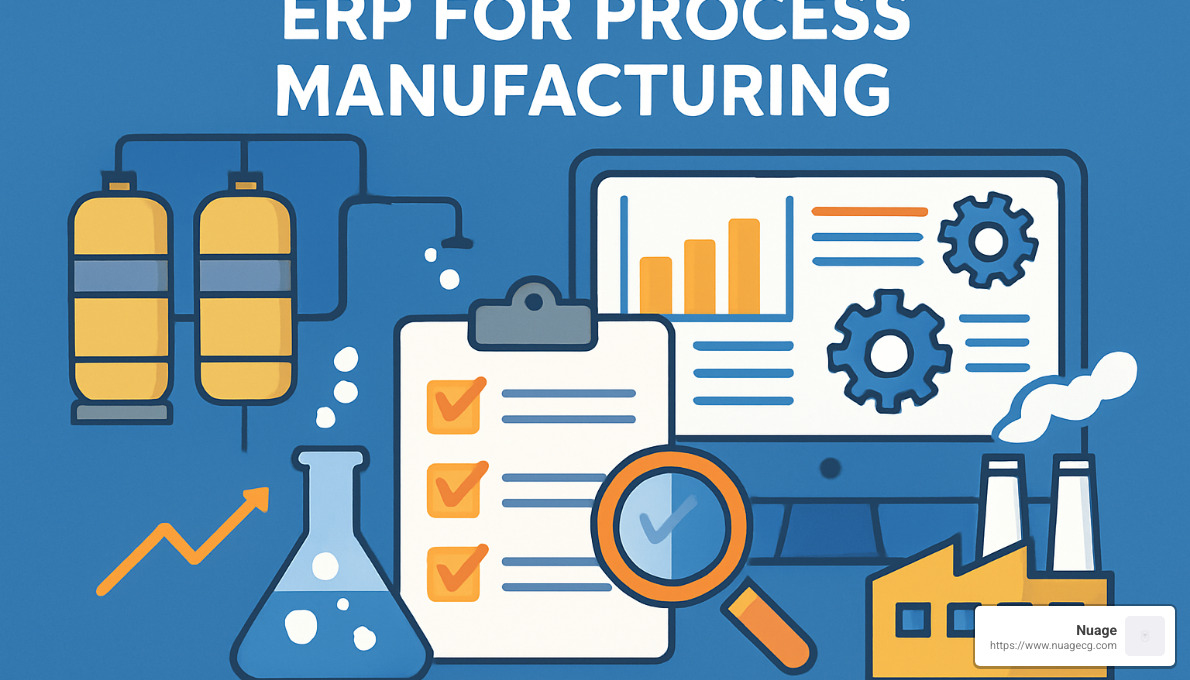
Feature #1 – Robust Recipe & Formula Management
At the heart of any ERP for process manufacturing is its formula management capability. Think of this as your system’s secret recipe book—but one that’s intelligent enough to adapt on the fly.
Your ERP should handle scaling factors automatically when batch sizes change. This isn’t as simple as multiplying everything by 2 or 3—some ingredients don’t scale linearly. For example, catalysts or flavor improvers might need different proportions at larger volumes.
Process manufacturing lives in the real world, where exact measurements aren’t always possible. That’s why you need tolerance limits that define acceptable ranges for ingredients while tracking when actual usage falls outside these parameters. This prevents unnecessary quality alerts while still maintaining control.
Many processes naturally generate co-products and by-products from a single production run. Your ERP needs to track these additional outputs, assign appropriate costs, and manage their inventory just as carefully as your primary products.
“We now have part numbers and BOMs for our entire product line,” shares Steven Plante, a Product Development Engineer who implemented a specialized process manufacturing solution. “The fact that we have all this information at our fingertips is invaluable.”
Feature #2 – End-to-End Lot Traceability
Lot traceability isn’t just about checking regulatory boxes—it’s about protecting your business and your customers. Modern systems like NetSuite offer robust traceability features that can save your reputation when problems arise.
The ability to run mock recalls lets you test your traceability systems without disrupting operations—like a fire drill for your data. When regulators ask if you’ve tested your recall procedures, you’ll have documented evidence ready.
When quality issues emerge, you need both backward and forward search capabilities. Backward tracing identifies where problematic ingredients came from, while forward tracing shows where they ended up—all in seconds, not days or weeks.
Your system should automatically generate Certificates of Analysis (CoAs) for each batch, incorporating test results and specifications. These documents aren’t just paperwork—they’re your proof of quality that customers increasingly demand.
For companies in food production, these traceability features are non-negotiable. Learn more about specialized capabilities in our guide to ERP for Food Manufacturing.
Feature #3 – Built-In Quality Control
In process manufacturing, quality isn’t something you check at the end—it’s built into every step of production. Your ERP should reflect this reality.
In-process testing capabilities allow you to define quality checkpoints throughout production. This helps catch issues early, before you’ve wasted more ingredients or time.
When tests fail or specifications aren’t met, your ERP should trigger non-conformance workflows that document the issue, assign responsibility, and track resolution. This creates accountability and ensures problems don’t slip through the cracks.
A structured approach to CAPA (Corrective and Preventive Action) helps prevent recurring issues and drives continuous improvement. This isn’t just good practice—it’s often required by regulatory bodies in regulated industries.
Feature #4 – Regulatory Reporting Automation
The paperwork burden in process manufacturing can be overwhelming without automation. Your ERP for process manufacturing should take this load off your shoulders.
Automatic label generation that incorporates lot numbers, expiration dates, and required regulatory information not only saves time but reduces the risk of costly labeling errors that could trigger recalls or compliance issues.
For chemical manufacturers, automatic Safety Data Sheet (SDS) generation based on formula components ensures accuracy and consistency. When formulations change, your SDS documents should update automatically.
Electronic submissions to regulatory bodies streamline compliance reporting, reducing administrative burden and minimizing human error. The right ERP can transform regulatory compliance from a headache into a competitive advantage.
Feature #5 – Real-Time Inventory Visibility
Process manufacturers face unique inventory challenges that generic ERP systems often handle poorly.
Multi-warehouse management capabilities track inventory across different locations, including in-transit inventory and consignment stocks. This gives you a complete picture of material availability for production planning.
Many process products require catch-weight handling—they’re sold by weight but handled in discrete units (like cheese wheels or meat cuts). Your ERP needs to track both the count and the variable weight to maintain accurate inventory valuation.
Expiration dating and shelf-life management are critical for ingredients and finished goods with limited lifespans. Sophisticated lot management should support first-expired-first-out (FEFO) picking strategies to minimize waste and maximize the value of your inventory.
Feature #6 – Advanced Planning & Scheduling
Efficient production planning can dramatically improve throughput and reduce costs for process manufacturers.
Batch sizing optimization tools help determine the most efficient production quantities based on equipment capacity, setup times, and demand patterns. This balances the cost of changeovers against inventory carrying costs.
Finite capacity scheduling accounts for actual equipment and resource constraints, not just theoretical capacity. This creates realistic production schedules that your team can actually achieve, rather than constantly fighting against impossible deadlines.
Material constraints management ensures your production plans consider ingredient availability and lead times. There’s nothing more frustrating than scheduling a production run only to find you’re missing a critical ingredient.
Feature #7 – Embedded Analytics & Dashboards
Data without insights is just noise. Modern ERP for process manufacturing solutions transform your data into actionable intelligence.
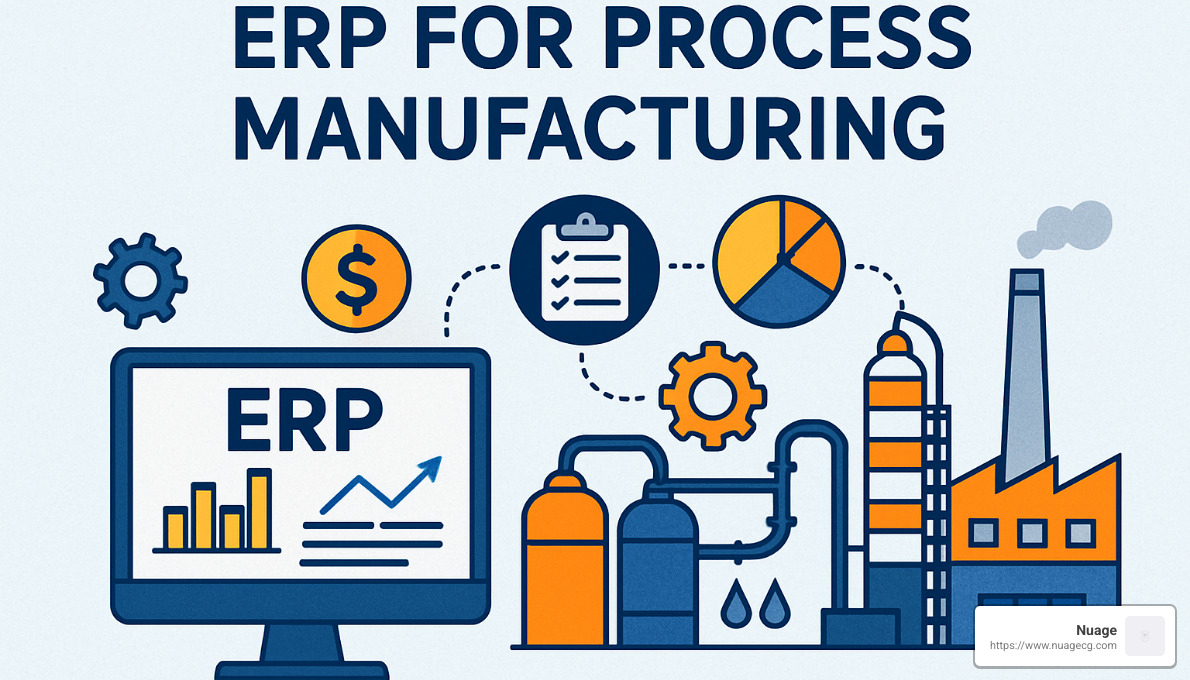
Overall Equipment Effectiveness (OEE) metrics provide real-time monitoring of equipment performance. This helps identify bottlenecks and improvement opportunities that might otherwise remain hidden in your operation.
Waste trend analysis helps identify patterns in material losses and their root causes. Even small reductions in waste can translate to significant cost savings over time, especially for high-value ingredients.
Margin analysis at the batch and product level reveals true profitability beyond simple gross margin calculations. This helps you focus on your most profitable products and identify opportunities to improve underperforming lines.
A recent industry survey revealed that manufacturers who implemented cloud-based ERP for process manufacturing experienced significant benefits: 56% reduced overall costs, 46% improved IT security, and 46% improved business agility and resilience.
Whether you’re considering NetSuite or another leading ERP solution, these seven features should be on your must-have list. The right system won’t just manage your data—it will transform how you do business.
Cloud vs On-Premise vs Hybrid: Deployment Showdown
The deployment model you choose for your ERP for process manufacturing significantly impacts implementation speed, ongoing costs, and operational flexibility. Let’s compare the options:
| Factor | Cloud | On-Premise | Hybrid |
|---|---|---|---|
| Initial Investment | Lower (subscription) | Higher (licenses + hardware) | Moderate |
| Ongoing Costs | Predictable subscription | Maintenance + upgrades | Mixed |
| Implementation Time | Faster | Longer | Moderate |
| Customization | Some limitations | Extensive | Flexible |
| Security Control | Vendor-managed | In-house | Shared |
| Accessibility | Anywhere, any device | Network-dependent | Mixed |
| Updates | Automatic, frequent | Manual, less frequent | Mixed |
| IT Resources Required | Minimal | Significant | Moderate |
ERP for Process Manufacturing in the Cloud
Cloud-based ERP for process manufacturing has gained significant traction in recent years, with good reason:
Automatic Upgrades
Cloud ERP vendors handle all updates and upgrades, ensuring you always have access to the latest features and security patches without burdening your IT team.
Anywhere Access
Cloud systems provide secure access from anywhere with an internet connection, supporting remote work and multi-site operations—particularly valuable for companies with distributed manufacturing facilities.
Resilience and Reliability
Enterprise-grade cloud providers typically offer better uptime, disaster recovery, and security than most companies can achieve with in-house systems.
A recent survey revealed that manufacturers who implemented cloud ERP experienced a 56% reduction in overall costs compared to their previous systems. This aligns with what we’ve seen at Nuage when implementing solutions like NetSuite for process manufacturers.
Randy Byle from Haviland Enterprises shares his experience: “Our distribution and manufacturing operations are far more agile because we now know precisely what products we have or need, in what quantities and exactly where they are located.”
Learn more about the benefits of Cloud Computing for process manufacturers.
ERP for Process Manufacturing in Hybrid Environments
While cloud deployments offer significant advantages, some process manufacturers benefit from hybrid approaches that combine cloud and on-premise elements:
Edge Devices and Local Controls
Process manufacturing often involves real-time control systems and IoT devices on the production floor. A hybrid approach allows these systems to operate locally while feeding data to cloud-based analytics and planning tools.
Data Sovereignty and Compliance
Some industries face regulatory requirements regarding data storage locations. Hybrid deployments allow you to keep sensitive data on-premise while leveraging cloud capabilities for less restricted functions.
At Nuage, we’ve helped many process manufacturers design hybrid deployments that balance local control needs with cloud benefits.
Cost & ROI: Crunching the Numbers
Investing in ERP for process manufacturing is a bit like buying a house – it’s a significant commitment upfront, but the long-term benefits can transform your business landscape. Let’s talk honestly about what this investment looks like and how to ensure you’re getting the best possible return.
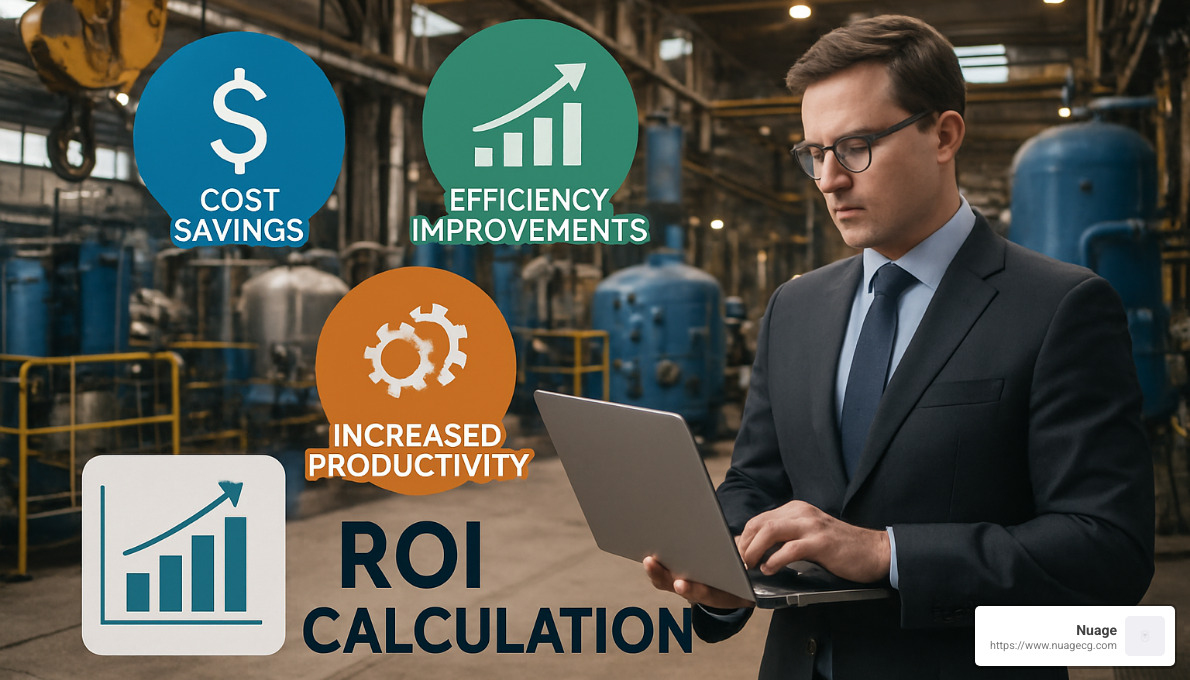
When we sit down with clients at Nuage, we often start by breaking down the cost structure. Traditional on-premise systems typically require hefty upfront license purchases – think of it as buying the house outright. Cloud solutions, on the other hand, use subscription models – more like renting with premium services included. While cloud systems usually have a gentler initial impact on your wallet, they may exceed on-premise costs if you’re looking at a 10+ year horizon.
The software itself is just the beginning. Implementation services typically run between 1-2 times the software cost, depending on how complex your operations are. This covers everything from analyzing your current processes and configuring the system to migrating your data and integrating with other systems. Think of it as not just buying the house, but making it truly work for your specific family needs.
Data migration deserves special attention – it’s often the hidden iceberg in ERP projects. Clean, accurate data is the lifeblood of your new system. As one of our clients at a chemical manufacturing plant told me, “We spent more time cleaning our data than we did implementing the software, but it was worth every minute.”
Training and support costs are non-negotiable if you want your team to accept the new system. Budget for initial training during implementation, ongoing training as you hire new team members, developing super-users who can help others, and creating documentation that captures your specific processes.
The good news? The returns can be substantial. A contract manufacturer we worked with reported an impressive 18-22% improvement in manufacturing efficiency after implementing their ERP for process manufacturing solution. While your results will depend on your unique situation, this demonstrates the potential when the implementation is done right.
Hidden Costs to Watch
Let’s talk about the costs that don’t always make it into the initial quote but can significantly impact your budget:
Customizations can be tempting but expensive. Modern solutions like NetSuite offer extensive configuration options that often eliminate the need for true customizations (changing the underlying code). When you modify the core software, you’re signing up for additional costs every time you upgrade.
Third-party add-ons might be necessary for specialized functions like advanced planning, quality management, or regulatory compliance. These increase both your initial investment and ongoing costs. We always recommend evaluating the total ecosystem cost, not just the core ERP price.
Poor adoption is perhaps the most significant hidden cost – and the hardest to quantify. If your team doesn’t fully accept the new system, you won’t realize the expected benefits. I’ve seen companies invest millions in sophisticated ERP for process manufacturing systems only to have employees create workarounds using spreadsheets because they weren’t comfortable with the new processes.
Strategies to Maximize ROI
After helping dozens of process manufacturers implement ERP systems, we’ve identified some proven strategies to maximize your return:
Phased rollout approaches typically yield better results than “big bang” implementations. Start with core functions like inventory and production, then add capabilities like quality management and advanced planning once you’ve established a solid foundation. This approach delivers value incrementally and gives your team time to adapt.
Lean process mapping before configuring your ERP is absolutely crucial. Don’t just automate broken processes – fix them first! An ERP implementation is the perfect time to eliminate inefficiencies. As one food manufacturer client told us, “We finded we had three different ways of doing the same thing across different shifts. Standardizing before implementing saved us countless headaches.”
KPI tracking from day one helps demonstrate value and identify areas needing attention. Define clear metrics before implementation and monitor them throughout the project. This not only helps justify the investment to stakeholders but also ensures you’re focusing on improvements that actually matter to your business.
According to a report on ERP implementation, companies that follow these best practices are significantly more likely to achieve their ROI targets. At Nuage, we’ve found that clients who invest in proper planning, change management, and training typically see positive returns within 12-18 months, compared to 24-36 months for those who cut corners in these areas.
Implementing ERP for process manufacturing isn’t just a technology project – it’s a business change initiative. When approached with that mindset, the ROI extends far beyond direct cost savings to include improved decision-making, improved customer satisfaction, and the ability to scale your business more effectively.
Step-By-Step Selection & Implementation Roadmap
Finding and implementing the perfect ERP for process manufacturing doesn’t happen by accident. It’s a journey that requires careful planning and execution. After helping dozens of process manufacturers transform their operations over the past 20 years, we’ve developed a proven roadmap that leads to success:
- Requirements Workshop
- Begin by documenting your current processes and identifying pain points. What’s working? What isn’t? This creates the foundation for everything that follows.
- Create clear distinctions between must-have features and nice-to-haves. This prevents scope creep and helps focus your selection process.
- Map out how your new ERP will integrate with existing systems like LIMS, MES, or e-commerce platforms.
- Establish realistic budget parameters and timeline expectations with stakeholder buy-in.
- Request for Proposal (RFP)
- Develop a structured RFP that clearly communicates your unique requirements to potential vendors.
- Include industry-specific scenarios that vendors must address. For example, how would their system handle a mock recall or a batch that falls outside quality parameters?
- Request references from customers in your specific industry who can speak to real-world performance.
- Vendor Demos
- Provide vendors with actual data and processes from your operation to demonstrate. Generic demos won’t reveal whether a system can handle your specific challenges.
- Involve key stakeholders from different departments to ensure diverse perspectives and needs are considered.
- Score vendors objectively against your requirements matrix to prevent decisions based solely on impressive presentations.
- Sandbox Testing
- Put shortlisted systems through their paces with your actual data and processes. This reveals capabilities and limitations that demos might not show.
- Verify that industry-specific requirements like formula management, lot traceability, and compliance reporting work as promised.
- Evaluate the user experience through the eyes of your team. The most powerful system won’t deliver ROI if people find it frustrating to use.
- Partner Evaluation
- The implementation partner often matters as much as the software itself. Assess their expertise in process manufacturing specifically.
- Review their implementation methodologies and project management approaches. Do they align with your company culture?
- Check references for similar implementations, asking specifically about how they handled challenges and change management.
- Change Management
- Develop a comprehensive change management plan that addresses the human side of implementation.
- Identify and train super-users who will become internal champions and resources.
- Create clear communication strategies for all stakeholders, from the shop floor to the C-suite.
- Go-Live Planning
- Establish clear criteria that must be met before go-live to prevent premature cutover.
- Develop contingency plans for various scenarios – what happens if something critical doesn’t work as expected?
- Create a detailed cutover plan with assigned responsibilities and timelines.
- Continuous Improvement
- Schedule regular post-implementation reviews to identify what’s working well and what needs adjustment.
- Look for opportunities to leverage additional automation and capabilities as your team grows more comfortable with the system.
- Stay current with your ERP vendor’s roadmap to take advantage of new features that could benefit your operation.
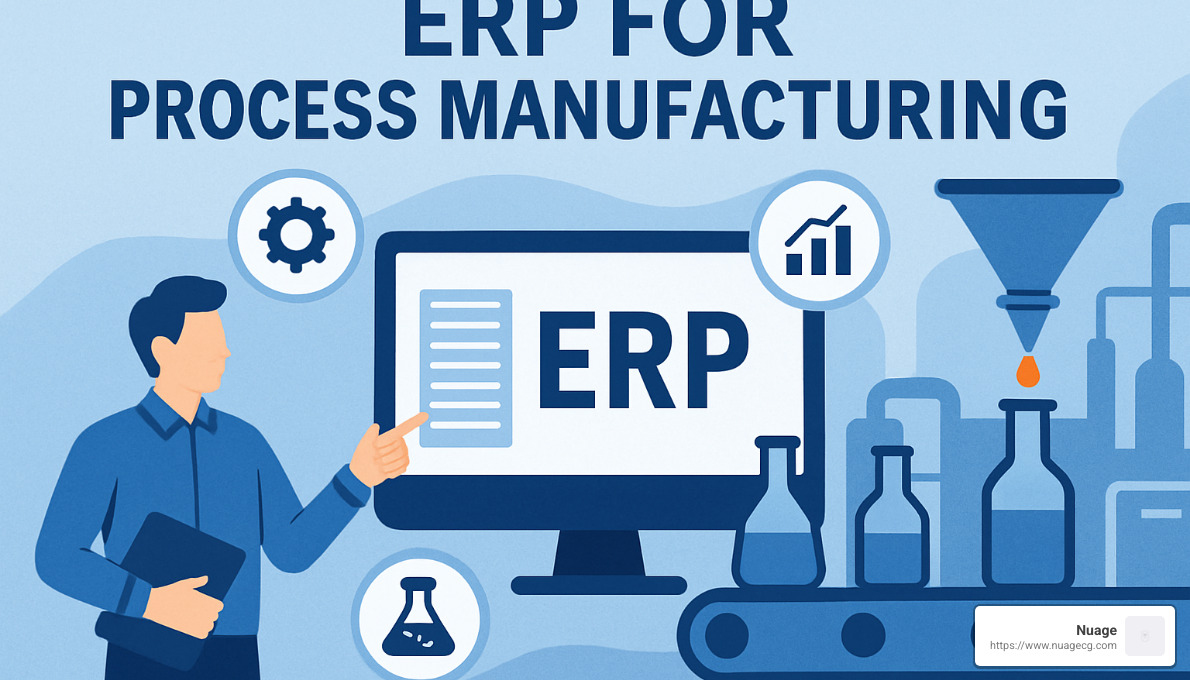
ERP for Process Manufacturing Vendor Shortlisting Tips
When evaluating vendors for your ERP for process manufacturing solution, keep these critical factors in mind:
Industry Fit
Look beyond generic manufacturing capabilities to find vendors with proven success in your specific industry niche. If you’re producing food and beverages, ensure the ERP has robust features for recipe management, allergen tracking, and regulatory compliance specific to your sector. The same goes for pharmaceuticals, chemicals, or cosmetics – each has unique requirements that not all systems handle well.
Roadmap Alignment
The ERP you choose today needs to support your business tomorrow. Evaluate vendor product roadmaps to ensure they align with your future needs. Is the vendor investing in areas that matter to your business, such as advanced analytics, IoT integration, or improved compliance features? At Nuage, we maintain deep relationships with both NetSuite to understand their future directions and help our clients make forward-looking decisions.
Reference Calls
There’s simply no substitute for speaking with existing customers in your industry. Schedule reference calls and ask pointed questions about implementation challenges, ongoing support quality, and whether the system delivered the promised ROI. A good vendor will be happy to connect you with successful clients.
Implementation Best Practices for ERP for Process Manufacturing
Having guided numerous clients through successful ERP Implementation projects, we’ve identified these key best practices:
Data Cleansing
Clean data forms the foundation of a successful implementation. Many companies underestimate the time and effort required here, but it’s worth every minute invested. Focus on:
Standardizing item codes and descriptions to eliminate duplicates and inconsistencies. This is particularly important for ingredients that may appear in multiple formulas.
Validating formulas and recipes to ensure they reflect current production realities, not historical or aspirational processes.
Cleaning up customer and vendor master data to improve reporting accuracy and streamline operations.
Archiving obsolete data rather than migrating it. Just because you can bring old data forward doesn’t mean you should.
Pilot Batches
Before full go-live, run pilot production batches through the new system alongside your existing processes. This parallel testing identifies issues before they impact your entire operation. We typically recommend running several cycles of increasingly complex scenarios, starting with your simplest products and working up to more challenging ones.
Super-User Network
The most successful implementations we’ve seen develop a network of super-users across different departments who receive advanced training and serve as local experts. These champions help drive adoption and provide first-level support to their colleagues. They also become valuable resources for future improvements and expansions of your ERP capabilities.
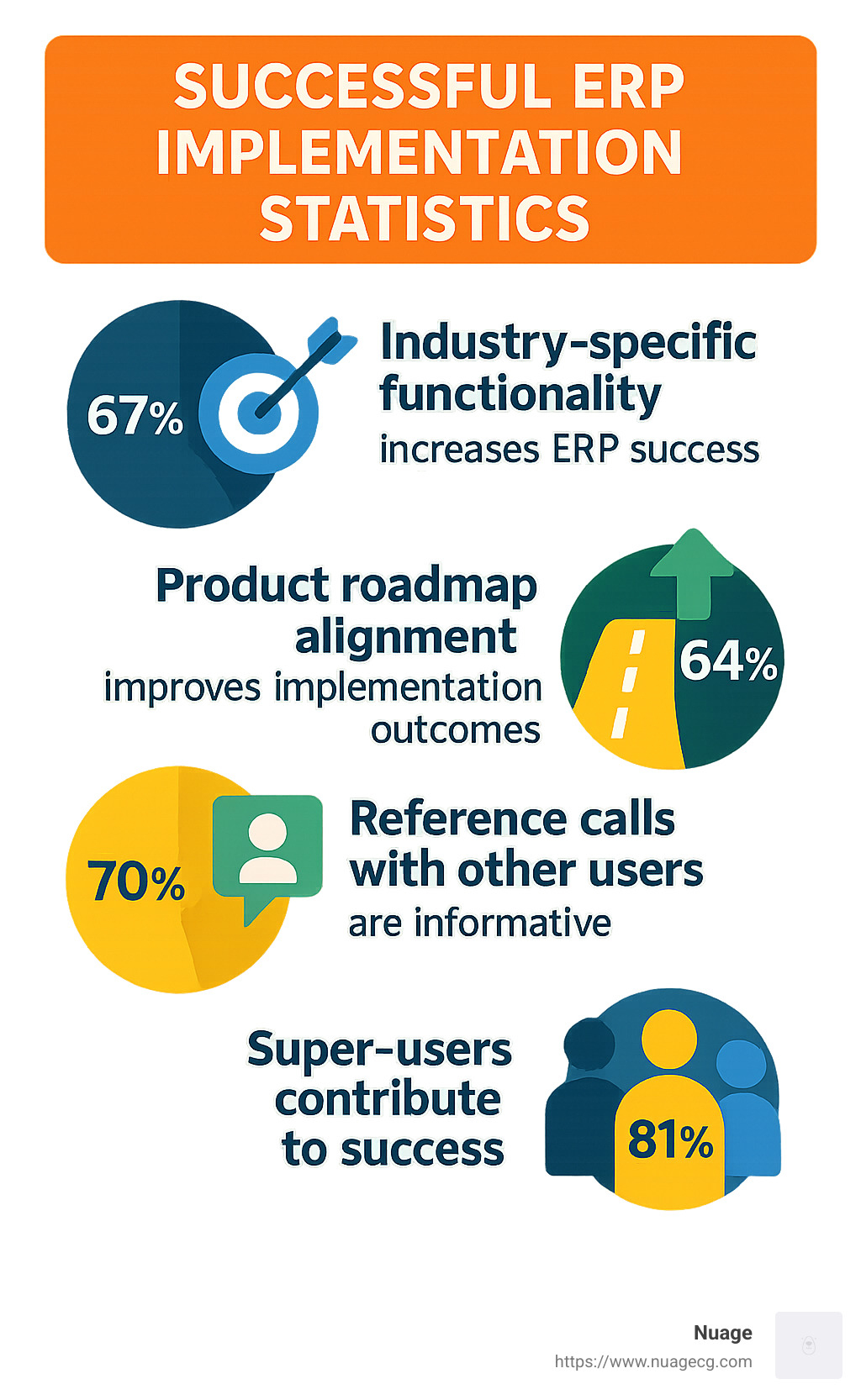
Frequently Asked Questions about ERP for Process Manufacturing
What makes ERP for process manufacturing different from discrete ERP?
ERP for process manufacturing fundamentally differs from discrete ERP in ways that directly impact your daily operations. Think of it this way: making cookies is nothing like assembling a bicycle.
With formula management (instead of bills of material), your system needs to handle recipes where ingredients blend together permanently. You’re dealing with pounds of flour and gallons of liquid rather than counting “4 screws and 2 brackets.” Once your ingredients mix, there’s no going back—unlike discrete manufacturing where you can disassemble a product.
Batch processing brings its own challenges. Two identical batches of cheese might yield slightly different amounts due to moisture content or milk quality. Your ERP needs to handle this natural variability gracefully.
Quality testing happens throughout production rather than just at the end. Your soap might need pH testing mid-process, not just final inspection. And when a customer reports an issue, you need bidirectional lot traceability to quickly determine which batches might be affected and where they went.
Regulatory requirements are typically much stricter too. If you’re producing food, pharmaceuticals, or cosmetics, your system needs robust features for electronic signatures, audit trails, and detailed documentation.
As Christina Morrison aptly puts it, “Most ERP systems available today are NOT suitable for Process Manufacturing” because they simply weren’t built with these specialized needs in mind.
How long does it take to implement an ERP for process manufacturing?
When clients ask me about implementation timelines for ERP for process manufacturing, I always start with “it depends” – but I know that’s not helpful on its own. Let me give you some realistic expectations based on what we’ve seen at Nuage over our 20+ years in the business.
For smaller manufacturers with a single site and relatively straightforward processes, you’re typically looking at 3-6 months from kickoff to go-live. Mid-sized companies with multiple product lines or facilities generally need 6-12 months. Large enterprises with complex operations often require 12-18+ months for full implementation.
Several factors will affect your specific timeline:
Your company’s size and complexity matters tremendously. More products, more regulations, and more locations all add time.
Cloud deployments like NetSuite typically move faster than on-premise solutions, sometimes cutting months off the timeline.
The more customizations you need, the longer it takes. This is why we often recommend configuring rather than customizing where possible.
Data migration complexity can be a real timeline-killer. Clean, well-structured data migrates quickly; messy data with lots of duplicates and inconsistencies can significantly extend your timeline.
I always recommend a phased approach rather than trying to implement everything at once. Start with core functions like inventory and production, then add capabilities like quality management and advanced planning. This lets you start seeing returns on your investment sooner while spreading out the change management load on your team.
Can ERP integrate with MES, CMMS and CRM systems?
Absolutely! Modern ERP for process manufacturing solutions are designed to connect with your other business systems. In fact, these integrations often deliver some of the biggest benefits.
With Manufacturing Execution Systems (MES), your ERP can exchange real-time data with shop floor systems. Production orders flow down to operators while actual production data, equipment status, and quality measurements flow back up. This gives you that elusive “single version of truth” across planning and execution.
For maintenance management, connecting your ERP with your CMMS means preventive maintenance can be scheduled in harmony with production planning. You’ll manage spare parts inventory more efficiently and track maintenance costs more accurately. NetSuite offer robust maintenance management capabilities that can either replace a separate CMMS or integrate with your existing system.
Customer Relationship Management integration gives your sales team visibility into production capabilities and inventory, while giving your production team insight into customer-specific requirements. Imagine your sales rep being able to confidently promise delivery dates based on actual production capacity rather than guesswork!
These integrations create what Randy Byle from Haviland Enterprises described to us as “all of the information we need into one centralized system,” making operations “far more agile because we now know precisely what products we have or need, in what quantities and exactly where they are located.”
At Nuage, we specialize in creating these connected environments. NetSuite offer powerful APIs and integration tools that we can leverage to build a truly unified business platform. Whether you need pre-built connectors or custom integrations, we can help you break down those information silos for good.
Conclusion & Next Steps
Choosing the right ERP for process manufacturing isn’t just another software decision—it’s a strategic choice that will shape your business operations for years to come. The unique nature of process manufacturing demands specialized solutions that understand the language of formulas, batches, quality testing, and regulatory compliance.
Throughout this guide, we’ve walked through the critical elements that make process manufacturing different and why generic ERP systems often fall short. We’ve explored how the right system transforms chaos into clarity, turning data into decisions that drive growth.
What matters most in your selection process? Focus on these key areas:
- Finding software with industry-specific functionality that speaks your language—whether you’re mixing chemicals, brewing beverages, or formulating pharmaceuticals
- Choosing the right deployment option that balances your need for control, accessibility, and IT resources
- Developing an implementation approach that delivers quick wins while building toward your complete vision
- Calculating the true return on investment beyond just cost savings to include improved compliance, better decision-making, and improved customer satisfaction
At Nuage, we’ve spent over two decades in the trenches with process manufacturers. We’ve seen the good, the bad, and the ugly of ERP implementations—and we’ve learned what works. Our experience spans food and beverage, chemical, pharmaceutical, and many other process industries.
What makes us different? We’re partners with NetSuite, but we’re not here to sell you software. We’re here to help you find the right solution for your specific challenges. Our approach starts with understanding your business, not with pitching a product.
Our team, working from our offices in Manhattan Beach, CA and Ponte Vedra, FL, brings real-world experience to every project. We’ve walked in your shoes, faced your challenges, and know how to steer the complex landscape of process manufacturing technology.
Ready to explore how the right ERP for process manufacturing could transform your business? Let’s have a conversation—no pressure, no sales pitch, just straight talk about your needs and how we might help. Reach out for a no-obligation consultation where we can discuss your specific situation and outline potential paths forward.
Successful ERP implementation isn’t just about installing software—it’s about bringing together people, processes, and technology to create meaningful change. With the right partner guiding your journey, you can join the 95% of businesses that report significant improvements after implementing the right system.
Want to learn more about how we approach ERP projects? Explore our NetSuite services to see how we help process manufacturers like you transform their operations every day.
Your journey to operational excellence starts with a single step—why not take it today?
